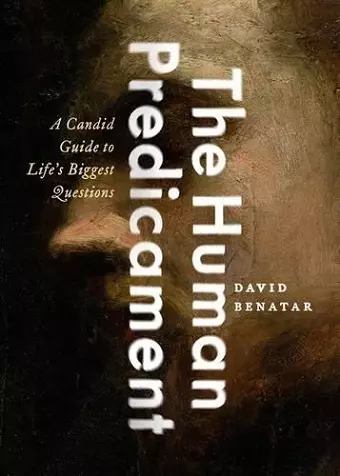The Human Predicament
A Candid Guide to Life's Biggest Questions
Format:Hardback
Publisher:Oxford University Press Inc
Published:13th Jul '17
Currently unavailable, our supplier has not provided us a restock date

Are human lives ultimately meaningless? Is our inevitable death bad? Would immortality be better? Should we hasten our deaths by taking our own lives in acts of suicide? Many people ask these big questions and many are plagued by them. Surprisingly few analytic philosophers have spoken to these important questions. When they have engaged the big existential questions they have tended, like more popular writers, to offer comforting, optimistic answers. The Human Predicament offers a less sanguine assessment. David Benatar invites readers to take a clear-eyed view of our situation, defending a substantial, but not unmitigated, pessimism about human life. Benatar argues that while our lives can have some meaning, cosmically speaking we are ultimately the insignificant beings that we often fear we are. A candid appraisal reveals that the quality of life, although less bad for some people than for others, leaves much to be desired in even the best cases. But death, David Benatar argues, is hardly the solution. Our mortality exacerbates rather than mitigates our cosmic meaninglessness. It can release us from suffering but even when it does it imposes another cost - annihilation. This unfortunate state of affairs has nuanced implications for how we should think about immortality, about suicide, and about the aspects of life in which we can and do find deeper meaning. Engaging profound existential questions with analytic rigor and clarity, The Human Predicament is clear eyed, unsentimental, and deeply provocative to some of our most cherished beliefs.
The Human Predicament is worth reading for its often insightful discussion of the practical implications of accepting the broad pessimistic contention that all lives are bad when judged by any relevant measure. * David Matheson, Carleton University, Canada, The Philosophical Quarterly *
Those readers familiar with Better Never to Have Been will find the discussion of the self in The Human Predicament worth their attention. However, I encourage first-time readers of Benetar's pessimistic philosphy to start with The Human Predicament. It is both highly accessible and engrossing -- so much so that it can be read in one day. * Kirsten Egerstrom, The Philosophers' Magazine *
What thinking person doesn't care about the (possible) meaning of life, the quality of human life, the nature and disvalue of death, the option of suicide, and many other similar topics? David Benatar addresses these engaging and important topics along with many others. The book is well-argued and extremely well-written. I was struck by the sense that the quality was about as high as any philosophy I can remember reading: short, clear sentences, with not a word wasted or misplaced. Even someone who is sunnier in outlook than Benatar, yet willing to take his arguments seriously, may end up finding that he or she agrees with most of them in this volume. I do not see the human predicament as pessimistically as David Benatar does; but I found myself disagreeing less than I expected to -- for example, in his sensitive and probing discussion of suicide. * David DeGrazia, George Washington University *
David Benatar's new book, The Human Predicament, offers justifiably pessimistic analyses of some of the most interesting and important issues of human existence, including birth, suffering, death, and suicide. Benatar's analyses are as beautifully crafted and written as they are scholarly and thoughtful. The Human Predicament is a grand work of philosophy, but contains important insights for many of the social and life sciences, including psychology, sociology, biology, as well as to medicine and law. Not only will I recommend this book to my colleagues and graduate and undergraduate students, but I also will recommend it to my family and friends. The Human Predicament is a stunning achievement by a deeply compassionate man. * Todd Shackelford, Distinguished Professor and Chair of Psychology, Oakland University *
ISBN: 9780190633813
Dimensions: 185mm x 135mm x 25mm
Weight: 318g
288 pages